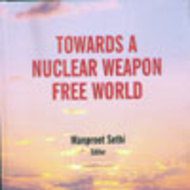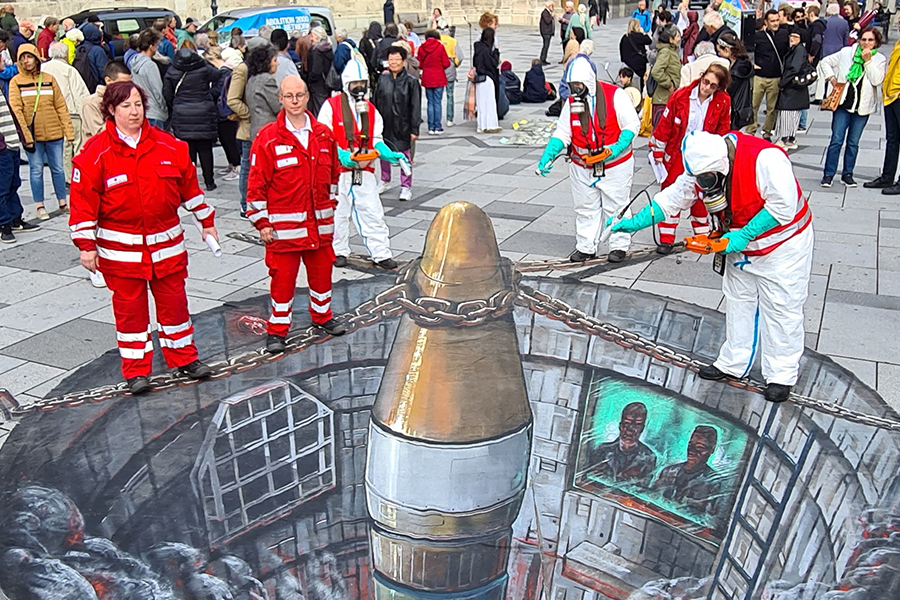Special Book Promotion at the United Nations
May 5, 2009
Project Report by Sarah Webb
On May 5, 2009, the United Nations Bookstore hosted a special event to promote the book, “Towards a Nuclear Weapon Free World,” edited by Manpreet Sethi and published by the Centre for Air Power Studies and Kalpana Shukla. The book features the presentations made at the 2008 high-level conference in New Delhi commemorating the Rajiv Gandhi Plan to Eliminate Nuclear Weapons, including presentations by Prime Minister Manmohan Singh, Vice President Hamid Ansari, External Affairs Minister Pranab Mukherjee, UN High Representative Sergio Duarte, GSI President Jonathan Granoff, former MPI Chairman Hon. Douglas Roche, O.C., and others.Several contributors to the book delivered presentations to the crowd of diplomats, NGOs, UN staff and students, including High Representative Duarte, Senator Roche and Mr. Granoff; additionally, Acting Permanent Representative of India, H.E. Mr. M.S. Puri, also delivered remarks on behalf of his Government, which co-sponsored the 2008 conference. Mr. Michael Cassandra, Chief of UN Monitoring, Database and Information of the Office for Disarmament Affairs, chaired the event.
 |
|
| Michael Cassandra introduces High Representative Duarte | |
“What’s past is prologue,” said High Representative Duarte, quoting Shakespeare’s famous line from The Tempest. With respect to global nuclear disarmament, this can either predict “a dark future based on the disappointing history of nuclear disarmament,” or this history can be viewed for its “wellspring for good ideas that deserve to be reconsidered, elaborated, and implemented.” In his view, the Rajiv Gandhi plan to eliminate nuclear weapons is one such idea that deserves careful reconsideration. While “hopes are rising once again”, remarked Ambassador Duarte, there remain many obstacles, “in particular the need to overcome the deceptive lure of the doctrine of nuclear deterrence.” It will be a particular challenge to establish the necessary “infrastructures of disarmament,” which must be created in order to dismantle the “infrastructures that sustain nuclear arms.” He called on the audience “to read this book and join the collective international effort to achieve global nuclear disarmament. Every person’s contribution helps a little. Let us start today.”
 |
|
|
Senator Douglas Roche, O.C.
|
Sen. Douglas Roche said he was familiar with India’s longstanding policy that it supports a global ban on nuclear weapons, but absent such a ban would continue to hold them. He said he had been in India twice last year and had spoken with India’s Prime Minister Manmohan Singh, who confirmed that India would support global efforts for nuclear disarmament. Expressing optimism about the new climate engendered by U.S. President Barack Obama, Senator Roche called on the government of India to join a movement for the start of comprehensive negotiations for a Nuclear Weapons Convention.
 |
|
|
Jonathan Granoff
|
Indians, noted Jonathan Granoff, revere Mahatma Gandhi in the way that Americans honor George Washington as the fathers of their respective countries. Gandhi believed that the near incomprehensible destructive power of nuclear weapons would so disgust humankind that they will turn away from violence for the time being, only to return to it with renewed zeal after the initial shock and horror has dissipated. Therefore, he reasoned, nuclear weapons cannot bring peace. Gandhi’s teachings are at the foundation of India’s position on nuclear weapons, reiterated clearly and unequivocally by Prime Minister Singh: India supports a universal, non-discriminatory, legally enforceable treaty, a convention, eliminating nuclear weapons. Such a principle places “a marker in the ground,” that then constitutes a metric for evaluating national security policy: “Policies that will ripen the political climate need to be advanced, and those that detract from that ripening need to be eschewed.” Yet India remains unwilling to begin a process of convening a nuclear weapons convention, maintaining that the political climate for such a convention is not yet ripe.
Ambassador Puri acknowledged the accuracy of Mr. Granoff’s summation of Indian nuclear policy, a commitment to a global, legally-binding abolition of nuclear weapons that is reiterated in their annual support for General Assembly resolutions supporting a convention. However, he maintained, India will not “be left on a limb” by leading efforts to disarmament if other countries are not legally obliged to follow. This position, he maintains, “takes into account humanity as a whole.” But to expect India to take a lead on nuclear disarmament, he argued, exculpates the originators of nuclear weapons from assuming the leadership of this process as they rightfully should.
 |
|
|
H.E. Mr. M.S. Puri
Acting Permanent Representative of India |
|
Prime Minister Rajiv Gandhi’s 1988 plan included the active engagement, not just of the world’s governments, but also of civil society. It is fitting, then, that such a diverse group of NGOs, parliamentarians and diplomats contributed to the book, and were present at its launch at the UN. As Prime Minister Gandhi said: “The battle for peace, disarmament and development must be waged both within this Assembly and outside by the peoples of the world. This battle should be waged in cooperation with scientists, strategic thinkers and leader of peace movements who have repeatedly demonstrated their commitment to those ideals. We, therefore, seek their cooperation in securing the commitment of all nations and all peoples to the goal of a non-violent world order free of nuclear weapons.”
The Global Security Institute wishes to express its prfound gratitude to Air Commodore Jasjit Singh, AVSM, VrC, VM, IAF (Retd) and the Centre for Air Power Studies in New Delhi for organizing and oustanding conference and publishing “Towards a Nuclear Weapon Free World.” We believe its high level substantive presentations can contribute to the global movement to eliminate nuclear weapons.
» Click here for more information on Towards a Nuclear Weapon Free World
![]()
Jonathan Granoff is the President of the Global Security Institute, a representative to United Nations of the World Summits of Nobel Peace Laureates, a former Adjunct Professor of International Law at Widener University School of Law, and Senior Advisor to the Committee on National Security American Bar Association International Law Section.








